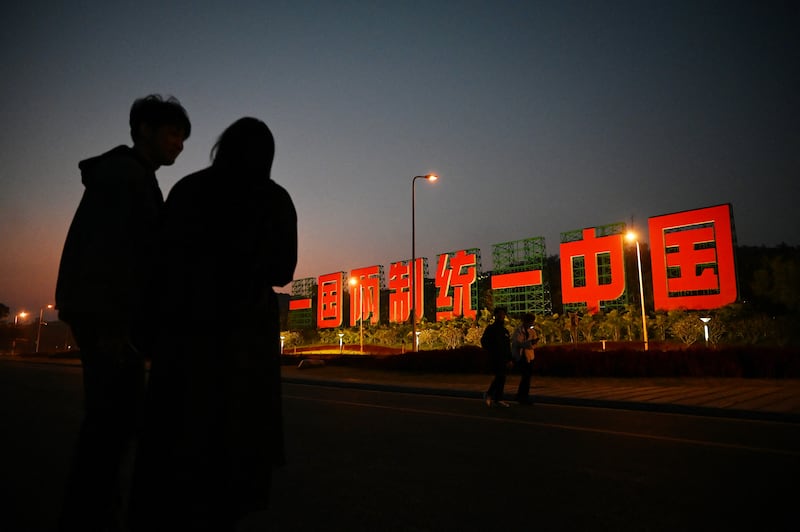In recent years, the unchecked spread of online misinformation – fueled by geopolitical tensions, algorithm-driven echo chambers, and state-sponsored propaganda – has posed growing risks to public trust and global stability. Against this backdrop, fact-checking journalism has become more vital than ever.
At the forefront of this effort has been Asia Fact Check Lab, committed to uncovering and challenging falsehoods across the region and beyond.
From exposing Chinese influence operations in Taiwan and neighboring countries, to investigating disinformation around Xinjiang, Tibet, natural disasters, COVID-19, and even North Korea’s military ties with Russia, AFCL has worked to hold power to account and inform the public with clarity and rigor.

Chinese influence campaign against Taiwan
“Cross-Strait Shadows: Inside the Chinese Influence Campaign Against Taiwan” is a three-part investigative series by AFCL exposing Beijing’s covert efforts to shape public opinion on the self-governed island.
Part I reveals how a fake opinion poll, tied to actors connected with China, was used to boost opposition candidates ahead of Taiwan’s 2024 election.
Part II investigates a pro-unification Taiwanese media figure secretly paid by China’s Fujian media group to attack pro-independence voices.
Part III uncovers how the Chinese state-run show “Taiwan’s Voice” partners with local broadcasters to subtly push Beijing’s narratives into Taiwan’s media landscape.
Together, the series highlights the Chinese Communist Party’s expanding and increasingly sophisticated influence operations across Taiwan’s democratic institutions.

Unpacking Beijing’s global PR offensive on Xinjiang, Tibet
AFCL has closely tracked Beijing’s attempts to reshape global perceptions of its policies in Xinjiang and Tibet.
One investigation revealed how Taiwanese YouTubers, after state-sponsored visits to Xinjiang, produced content echoing Beijing’s narrative – later amplified by Chinese state media to downplay rights abuses. Another report debunked a Chinese TV segment that falsely claimed a Stanford study supported China’s position on Western disinformation, when the study said no such thing.
In Tibet, AFCL challenged official Chinese claims that nearly all Tibetans speak their native language. Investigations revealed that a significant number of Tibetans, especially in regions like Qinghai and Sichuan, have lost proficiency in their ancestral tongue. This decline is attributed to policies that favor Mandarin over Tibetan in education and public life, leading to concerns about cultural assimilation.

Beyond China, Asia
While much of AFCL’s work has focused on Chinese disinformation, its investigations extend well beyond China and Taiwan.
The team has also tackled false narratives involving North Korea, including claims tied to Pyongyang’s military involvement in Russia’s war on Ukraine.
In one case, a viral video supposedly showing a state funeral for a North Korean general killed in Ukraine was proven to be repurposed footage from 2015. In another, misleading content circulating on Chinese platforms falsely portrayed heightened inter-Korean military tensions, using outdated or unrelated imagery.
AFCL has also broadened its investigative work beyond Asia to tackle misinformation circulating globally – most notably around the 2024 U.S. presidential election, where false narratives gained traction in Chinese-language media.
One report refuted viral claims that Donald Trump’s 34 felony convictions were dropped following his re-election, confirming that legal proceedings are still ongoing. AFCL also identified a doctored image, widely shared to exaggerate crowd size at a Trump rally, as originating from a 2020 concert.

Natural disasters and incidents
Natural disasters and major incidents often spark a wave of online misinformation, with AI-generated images, misattributed footage, and baseless rumors spreading rapidly.
AFCL has played a key role in debunking such viral falsehoods. After Myanmar‘s devastating 7.7-magnitude earthquake in March 2025, for instance, AFCL exposed a widely shared video as AI-generated fakery.
When a Delta flight crashed in Toronto, the team refuted claims that the pilot was unqualified, confirming both crew members were fully certified.
And during the California wildfires, AFCL dismantled hoaxes showing the Hollywood sign ablaze – images that were fabricated or generated by AI.
These investigations highlight the critical need for fact-checking during crises, when misleading content can fuel panic and obscure the truth.
COVID-19
Misinformation surrounding COVID-19 proved to be one of the most dangerous forms of disinformation in recent history, fuelling confusion, undermining public health efforts, and costing lives.
From false narratives about vaccine safety to manipulated reports on outbreaks and government responses, the pandemic created a fertile ground for viral falsehoods. AFCL played a vital role in countering these claims.
In late 2024, AFCL debunked a widely shared image that falsely showed overcrowded hospitals in China amid a supposed new wave of infections – the photo was, in fact, from early 2023. AFCL also exposed baseless rumors that a Pfizer executive had died from COVID-19, clarifying the individual had no ties to the company. After a deadly apartment fire in Urumqi, Xinjiang, AFCL raised doubts about Chinese officials’ denials that COVID lockdowns delayed rescue efforts.
Edited by Taejun Kang and Mike Firn.
Asia Fact Check Lab (AFCL) was established to counter disinformation in today’s complex media environment. We publish fact-checks, media-watches and in-depth reports that aim to sharpen and deepen our readers’ understanding of current affairs and public issues. If you like our content, you can also follow us on Facebook, Instagram and X.
rfa.org (Article Sourced Website)
#Antidote #misinformation #Key #stories #Asia #Fact #Check #Lab
